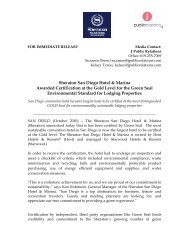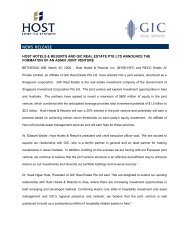Host Marriott 2004 Annual Report - Host Hotels & Resorts, Inc
Host Marriott 2004 Annual Report - Host Hotels & Resorts, Inc
Host Marriott 2004 Annual Report - Host Hotels & Resorts, Inc
Create successful ePaper yourself
Turn your PDF publications into a flip-book with our unique Google optimized e-Paper software.
cash flows for the hotel would be less than the net book value<br />
of the hotel. For impaired assets, we record an impairment<br />
charge when a property’s fair value less selling costs is less<br />
than its net book value. We test for impairment in several<br />
situations, including when current or projected cash flows<br />
are less than historical cash flows, when it becomes more<br />
likely than not that a hotel will be sold before the end of its<br />
previously estimated useful life, as well as whenever an asset<br />
is classified as “held for sale” or events or changes in circumstances<br />
indicate that a hotel’s net book value may not be<br />
recoverable. In the evaluation of the impairment of our<br />
hotels, we make many assumptions and estimates, including:<br />
■ projected cash flows;<br />
■ holding period;<br />
■ expected useful life;<br />
■<br />
■<br />
future capital expenditures; and<br />
fair values, including consideration of capitalization<br />
rates, discount rates and comparable selling prices.<br />
Changes in these estimates, assumptions, future changes in<br />
economic conditions, or property-level results could require us<br />
to record additional impairment charges, which would be<br />
reflected in operations in the future.<br />
• Classification of Assets as “Held for Sale.” We classify properties<br />
that we are actively marketing as held for sale when all of the<br />
following conditions are met:<br />
■ our Board of Directors has approved the sale (to the extent<br />
the dollar magnitude of the sale requires Board approval);<br />
■ a binding agreement to purchase the property has<br />
been signed;<br />
■ the buyer has committed a significant amount of<br />
non-refundable cash; and<br />
■ no significant financing contingencies exist which<br />
could cause the transaction not to be completed in<br />
a timely manner.<br />
To the extent a property is classified as held for sale and its<br />
fair value less selling costs is lower than the net book value of<br />
the property, we will record an impairment loss. See the discussion<br />
above concerning the use of estimates and judgments in<br />
determining fair values for impairment tests.<br />
• Depreciation and Amortization Expense. Depreciation expense<br />
is based on the estimated useful life of our assets and amortization<br />
expense for leasehold improvements is the shorter<br />
of the lease term or the estimated useful life of the related<br />
assets. The lives of the assets are based on a number of<br />
assumptions including cost and timing of capital expenditures<br />
to maintain and refurbish the assets, as well as specific<br />
market and economic conditions. While management<br />
believes its estimates are reasonable, a change in the estimated<br />
lives could affect depreciation expense and net income<br />
(loss) or the gain or loss on the sale of any of our hotels.<br />
• Valuation of Deferred Tax Assets. We have approximately<br />
$111 million, net of a valuation allowance of $14 million,<br />
in consolidated deferred tax assets as of December 31,<br />
<strong>2004</strong>. The objective of financial accounting and reporting<br />
standards for income taxes are to recognize the amount<br />
of taxes payable or refundable for the current year and<br />
deferred tax liabilities and assets for the future tax consequences<br />
of events that have been recognized in a company’s<br />
financial statements or tax returns. We have considered<br />
various factors, including future reversals of existing taxable<br />
temporary differences, future projected taxable income and<br />
tax planning strategies in determining a valuation allowance<br />
for our deferred tax assets, and we believe that it is more<br />
likely than not that we will be able to realize the $111 million<br />
in deferred tax assets in the future. When a determination<br />
is made that all, or a portion, of the deferred tax assets<br />
may not be realized, an increase in income tax expense<br />
would be recorded in that period.<br />
• Valuation of Foreign Currency and Derivative Contracts. We<br />
have two interest rate swap agreements outstanding as of<br />
December 31, <strong>2004</strong>. Our interest rate swap agreements with<br />
a fair market value of $19 million as of December 31, <strong>2004</strong><br />
have been designated as fair value hedges, as described in<br />
Note 1 to our consolidated financial statements. While we<br />
intend to continue to meet the conditions for hedge accounting,<br />
if a particular interest rate swap does not qualify as<br />
highly effective, any change in the fair value of the derivative<br />
used as a hedge would be reflected in current earnings.<br />
Should any change in management strategy, or any other<br />
circumstance, cause an existing highly-effective hedge to<br />
become ineffective, the accumulated loss or gain in the value<br />
of the derivative instrument since its inception may be<br />
reclassified from the stockholders’ equity section of the balance<br />
sheet to current net income (loss). We also have two<br />
interest rate cap agreements that are fair valued each quarter<br />
and the increase or decrease in fair value is recorded in net<br />
income (loss). We also have several foreign currency forward<br />
exchange contracts that we previously used to hedge the<br />
mortgage loan on our Canadian properties. The hedge was<br />
deemed ineffective for accounting purposes in the fourth<br />
quarter of 2003. Accordingly, the change in fair value of<br />
these foreign currency forward exchange contracts is<br />
recorded in net income (loss) on the consolidated statements<br />
of operations. See the discussion in “Quantitative and<br />
Qualitative Disclosures About Market Risk.” We estimate the<br />
fair value of all of these instruments through the use of third<br />
party valuations, which utilize the market standard methodology<br />
of netting the discounted future cash receipts and the<br />
discounted expected cash payments. The variable cash flow<br />
streams are based on an expectation of future interest and<br />
exchange rates derived from observed market interest and<br />
exchange rate curves. The values of these instruments will<br />
change over time as cash receipts and payments are made<br />
and as market conditions change. Any event that impacts the<br />
level of actual and expected future interest or exchange rates<br />
will impact our valuations. The fair value of our existing foreign<br />
currency and derivatives is likely to fluctuate materially<br />
from year to year based on changing levels of interest and<br />
exchange rates and shortening terms to maturity.<br />
• Consolidation Policies. Judgment is required with respect to<br />
the consolidation of partnership and joint venture entities in<br />
the evaluation of control, including assessment of the importance<br />
of rights and privileges of the partners based on voting<br />
rights, as well as financial interests that are not controllable<br />
through voting interests. Currently, we have investments in<br />
entities that in the aggregate own 123 hotel properties and<br />
35<br />
HOST MARRIOTT <strong>2004</strong>








